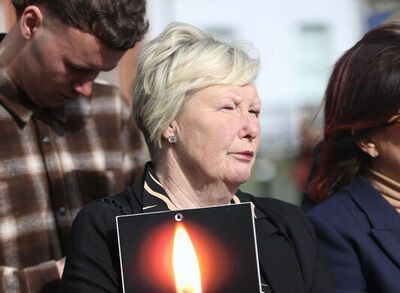Frank O’Connor in a picture taken in 1958 by his wife Harriet, who died on April 17, 2016.
USED WITH PERMISSION OF FRANK O'CONNOR ESTATE
By J.R. McCarthy
Even if there were only two men left in the world and both of them saints, they wouldn’t be happy. One of them would be bound to try and improve the other. That is the nature of things. From "Song Without Words,” by Frank O’Connor.
His voice does not necessarily strike me as a lonely voice. His voice, among other fine things, gave the world beautiful stories, peopled by sympathetic and resonating characters. “Song Without Words” is one of the most beautiful stories I’ve ever read. It tells of a bumpy but enduring friendship between two monks.
As befitting the rule of silence, there is not a single word of dialogue in the story. As befitting the style and character of its author, christened Michael Francis O’Donovan, but better known as Frank O’Connor, “Songs Without Words” is narrated with bracing honesty, but deep compassion. Brother Arnold catches Brother Matthew in the monastery stable indulging his unseemly enthusiasm for what ends up being the Irish Racing News. Not to be outdone in iniquity, Brother Arnold reveals to Brother Matthew his passion for, and his cache of “good beer.” Without a spoken word between them, two men who did not much care for one another become “fast friends,” for “they no longer have any secrets from each other. Each knew the full extent of the others little weaknesses, and liked him the more for it.”
Having neither the funds nor the opportunity to bet on the horses, they agree to gamble with prayers for one another. In no time at all – as monastery time is counted – Brother Matthew despairs that Brother Arnold will never get out from under the number of Hail Mary’s he owes to Brother Matthew’s intention. Brother Matthew introduces an ancient deck of playing cards into the mix, and both monks realize that for the sake of their immortal souls, they must eschew their guilty pleasures and turn themselves in to the Prior. Will their friendship survive their resolve to sin no more? Only monastery time will tell.
I think good writers should go directly to heaven when they die, and I hope they do. It might be blasphemous to suggest that good writers save souls, but surely good stories have hastened many a soul in the direction of redemption. Frank O’Connor died 50 years ago this past March 10 - seven days before St. Patrick’s Day, and just weeks before the 50th anniversary of the Easter Rebellion. In this centenary year of the beginning of modern Ireland, we Irish Americans, who incompletely educated about our literary heritage and trying to make up for lost time, could do worse than to consider his memory and his legacy. Frank O’Connor had a soft spot in his rigorously honest heart for the incompletely educated – to say nothing of the blasphemous - and we couldn’t ask for a better guide.
‘Upturned faces’
I was already thinking of Frank O’Connor before Feb. 21 when Nelle Harper Lee, author of the quintessential American novel, “To Kill a Mockingbird,” passed away at the age of 89. I actually started thinking about O’Connor some seven months before, with the long-awaited publication of “Go Set a Watchmen” – technically Lee’s only other novel, but actually her first stab at the tale that would become “Mockingbird.” I always think of Frank O’Connor when I think of “To Kill a Mockingbird.” I have only recently wondered if I am the only one. “Mockingbird” is a recollection of an eventful childhood from the wry perspective of a brilliant and discursive adult. It first enthralled me long ago, in the summer between 7th and 8th grade. It enthralls me still.
But my original encounter with the poignant clash of childhood innocence and stark adult reality, related in vivid, often hilarious detail, and with guileless candor, came in the winter before that summer. In the course of the school year, I read a short story called “The Man of the House,” written by a man who, like my grandfather, was born in Cork in the first few years of the 20th century. Frank O’Connor’s gift for rendering the child’s perspective in adult language was a revelation to me. O’Connor, in the words of Richard Ellmann, “delights in showing their [children’s] upturned faces as they stare at adults whose behavior is so irrational compared to their own.”
“The Man of the House” is one of several memorable short stories O’Connor used to dramatize his hardscrabble, often harrowing childhood. The 10-year-old Gus is dispatched by a Poor-Laws doctor to fetch a bottle of medicine for his ailing mother. Waiting at the dispensary for the medicine, he meets a young girl who has become, in this “queer old world”, an expert on the black and red bottles the pharmacist provides. She persuades him to share the medicine with her, and advises him to add water to the bottle to conceal their tippling. Gus realizes the error of his ways only when the bottle is empty. (He is doubly confounded to remember that he had originally promised to light a candle to the Virgin Mary with the penny he used to buy the sweets that he and the girl consume before turning to the medicine.) He returns to his all-forgiving mother, who seems to have recovered from her illness in time to comfort her afflicted son.
In the world of Frank O’Connor, the bonds of friendship and of family seem to grow stronger not in spite of our foibles, but because of them. The child protagonist is led astray by a young temptress, but receives unconditional love and acceptance from a long-suffering mother. In “The Man of the House,” every temptation narrative handed down since the Garden of Eden is recast with two children, living amid sickness and poverty, along the glens and riversides of Southern Ireland. Brother Arnold and Brother Matthew, who, in “Songs Without Words,” conspire to maintain both their innocence and their humanity in the deafening silence of monasticism, are as childlike as the boy and girl in “The Man of the House” - and as likely to find redemption.
A hit with teens
I have often had the pleasure of presenting two of O’Connor’s most noted stories, “My Oedipus Complex” and “First Confession,” to my students. “First Confession,” in which young Jackie confesses his desire to kill his grandmother to a sympathetic young prelate, resonated, not surprisingly, with some of the livelier students I met at the Catholic high school in the Bronx where I taught for many years. In my experience, “My Oedipus Complex” resonates with most teenagers who read it – and provides them with a somewhat gentle introduction to some of the more provocative elements of both Sophocles and Sigmund Freud. The Oedipus complex in the title bedevils the child narrator, Larry, who is angry that his father has come home to the family from a stint of military service, and furious when the reunion between his parents yields him a baby brother.
Michael O’Donovan, not yet 20, spent nine months in prison when the Free Staters prevailed in the Irish Civil War. (“Guests of the Nation,” O’Connor’s tale of two young Irish soldiers and their British prisoners, gives the world as heart-breaking an analysis of the futility of war as has ever been written.) He took Mother Church at her word when she placed him and all the other rebels outside the sacraments for participating in the second rebellion: although he maintained friendships among the clergy all of his life, he never went back to the practice of Catholicism. “Songs Without Words” is just one O’Connor narrative that suggests an abiding affection – even a respect – for that man of the cloth who wants only to serve God and his fellows.
O’Connor returns to the confessional and to the priesthood in “News For the Church,” in which an elderly priest, scandalized by a matter-of-fact confession to pre-marital sex by a 19-year-old girl, turns the tables on his remorse-challenged penitent by interrogating her, with excruciating precision, on the strength of what he has gleaned about human sexuality from behind the confessional screen.
In “Judas,” Jerry, our narrator, falls in love with Kitty Doherty, and can neither bear to tell her directly of his feelings, nor shake the sense that he will betray his widowed mother if he takes up with a girl. Just as the elderly priest in “News For The Church” could be an older version of the priest we meet in “First Confession,” Jerry could be, in terms of both his voice and his sensibility, little Larry, the outraged narrator of “My Oedipus Complex,” grown up, but still stubbornly committed to codependence.
Some lonely voice: who was it who said, “Here Comes Everybody?”
Among the many excellent anthologies of O’Connor’s over 150 works of short fiction, I commend Vintage’s “Frank O’Connor: Collected Stories,” with its excellent introduction by Richard Ellmann. James McKeon’s “Frank O’Connor: A Life” is a fine biography, and a wonderful testament to O’Connor’s scholarship, his relationship with William Butler Yeats, and his ubiquitous presence in the development of Ireland’s literary and theatrical traditions following independence. Anyone who wants to try his or her luck at the crafting of a good story will find no better tutor than “The Lonely Voice,” O’Connor’s own masterful take on the subject. O’Connor’s autobiographical sketches, “An Only Child” and “My Father’s Son,” give the reader an opportunity to see how closely the author’s narrative imitate his life
Born in time to see Easter Monday, 1916, and gone from us by the dawn of its Golden Anniversary, Frank O’Connor’s life and work encapsulates virtually everything that a child of Ireland should remember and celebrate in this centennial year of the Rising. His may have been a lonely voice, but it was rarely without charity, and it was never without clarity.
Bronx native J.R. McCarthy is a schoolteacher and a poet.










